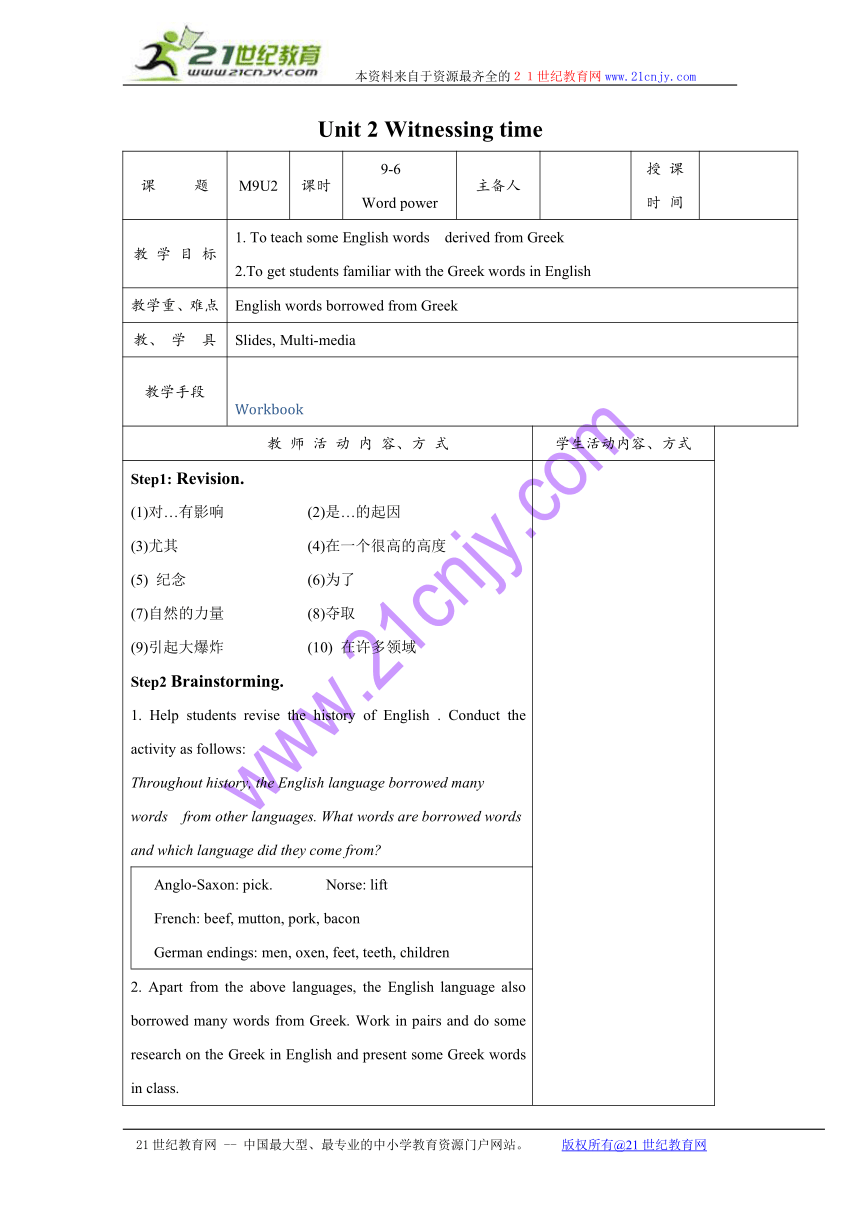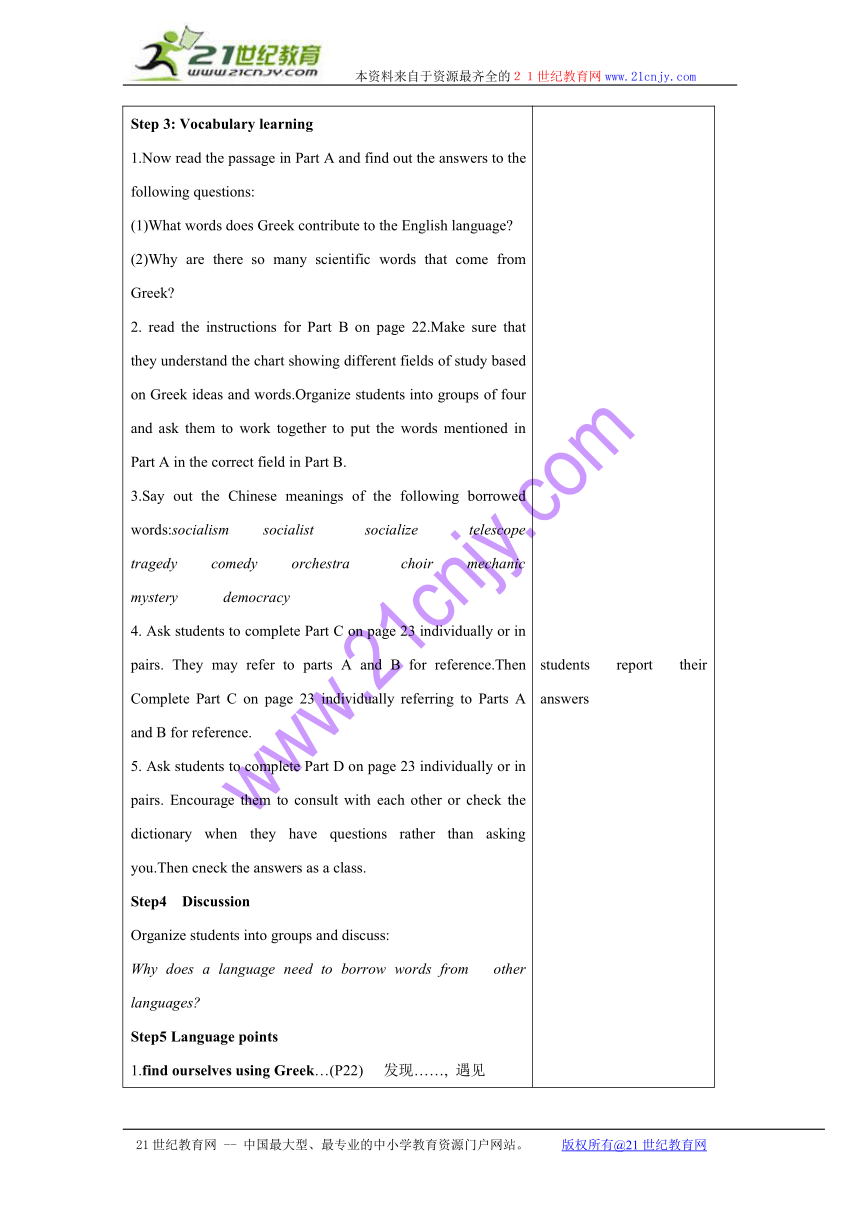Unit2 Witnessing time 教案-word power(牛津译林版选修9)
文档属性
| 名称 | Unit2 Witnessing time 教案-word power(牛津译林版选修9) |

|
|
| 格式 | rar | ||
| 文件大小 | 20.1KB | ||
| 资源类型 | 教案 | ||
| 版本资源 | 牛津译林版 | ||
| 科目 | 英语 | ||
| 更新时间 | 2009-07-14 18:42:00 | ||
图片预览


文档简介
本资料来自于资源最齐全的21世纪教育网www.21cnjy.com
Unit 2 Witnessing time
课 题 M9U2 课时 9-6Word power 主备人 授 课 时 间
教 学 目 标 1. To teach some English words derived from Greek2.To get students familiar with the Greek words in English
教学重、难点 English words borrowed from Greek
教、 学 具 Slides, Multi-media
教学手段 Workbook
教 师 活 动 内 容、方 式 学生活动内容、方式
Step1: Revision.(1)对…有影响 (2)是…的起因(3)尤其 (4)在一个很高的高度(5) 纪念 (6)为了(7)自然的力量 (8)夺取(9)引起大爆炸 (10) 在许多领域Step2 Brainstorming.1. Help students revise the history of English . Conduct the activity as follows:Throughout history, the English language borrowed many words from other languages. What words are borrowed words and which language did they come from Anglo-Saxon: pick. Norse: liftFrench: beef, mutton, pork, baconGerman endings: men, oxen, feet, teeth, children2. Apart from the above languages, the English language also borrowed many words from Greek. Work in pairs and do some research on the Greek in English and present some Greek words in class.Step 3: Vocabulary learning1.Now read the passage in Part A and find out the answers to the following questions:(1)What words does Greek contribute to the English language (2)Why are there so many scientific words that come from Greek 2. read the instructions for Part B on page 22.Make sure that they understand the chart showing different fields of study based on Greek ideas and words.Organize students into groups of four and ask them to work together to put the words mentioned in Part A in the correct field in Part B.3.Say out the Chinese meanings of the following borrowed words:socialism socialist socialize telescope tragedy comedy orchestra choir mechanic mystery democracy4. Ask students to complete Part C on page 23 individually or in pairs. They may refer to parts A and B for reference.Then Complete Part C on page 23 individually referring to Parts A and B for reference.5. Ask students to complete Part D on page 23 individually or in pairs. Encourage them to consult with each other or check the dictionary when they have questions rather than asking you.Then cneck the answers as a class.Step4 Discussion Organize students into groups and discuss:Why does a language need to borrow words from other languages Step5 Language points1.find ourselves using Greek…(P22) 发现……, 遇见e.g:I've just found a ten-pound note in my pocket.[+ two objects] Has he found himself a place to live yet [+ object + adjective] She was found unconscious and bleeding.[+ that] The study found that men who were married lived longer than those who were not.e.g:Do you think they'll ever find a way of bringing peace to the region (06广东)So difficult ______ it to work out the problem that I decided to ask Tom for advice. A.I did find B. did I find C.I have found D.have I found(04江苏)The man insisted______a taxi for me even though I told him I lived nearby. A. find B. to find C. on finding D. in finding(05重庆)— What should I do with this passage — ____________the main idea of each paragraph. A.Finding out B.Found out C.Find out DTo find out(05广东)He hurried to the station only__that the train had left. A. to find B. finding C. found D. to have found (06北京)--- _______ leave at the end of this month. --- I don’t think you should do that until ________ another job.
A. I’m going to; you’d found B. I’m going to; you’ve found
C. I’ll; you’ll find D. I’ll; you’d findStep6 Summary and homeworkFind out more borrowed words and do exercises in workbook. students report their answersSS discuss the question.Ss do the exercises.
21世纪教育网 -- 中国最大型、最专业的中小学教育资源门户网站。 版权所有@21世纪教育网
Unit 2 Witnessing time
课 题 M9U2 课时 9-6Word power 主备人 授 课 时 间
教 学 目 标 1. To teach some English words derived from Greek2.To get students familiar with the Greek words in English
教学重、难点 English words borrowed from Greek
教、 学 具 Slides, Multi-media
教学手段 Workbook
教 师 活 动 内 容、方 式 学生活动内容、方式
Step1: Revision.(1)对…有影响 (2)是…的起因(3)尤其 (4)在一个很高的高度(5) 纪念 (6)为了(7)自然的力量 (8)夺取(9)引起大爆炸 (10) 在许多领域Step2 Brainstorming.1. Help students revise the history of English . Conduct the activity as follows:Throughout history, the English language borrowed many words from other languages. What words are borrowed words and which language did they come from Anglo-Saxon: pick. Norse: liftFrench: beef, mutton, pork, baconGerman endings: men, oxen, feet, teeth, children2. Apart from the above languages, the English language also borrowed many words from Greek. Work in pairs and do some research on the Greek in English and present some Greek words in class.Step 3: Vocabulary learning1.Now read the passage in Part A and find out the answers to the following questions:(1)What words does Greek contribute to the English language (2)Why are there so many scientific words that come from Greek 2. read the instructions for Part B on page 22.Make sure that they understand the chart showing different fields of study based on Greek ideas and words.Organize students into groups of four and ask them to work together to put the words mentioned in Part A in the correct field in Part B.3.Say out the Chinese meanings of the following borrowed words:socialism socialist socialize telescope tragedy comedy orchestra choir mechanic mystery democracy4. Ask students to complete Part C on page 23 individually or in pairs. They may refer to parts A and B for reference.Then Complete Part C on page 23 individually referring to Parts A and B for reference.5. Ask students to complete Part D on page 23 individually or in pairs. Encourage them to consult with each other or check the dictionary when they have questions rather than asking you.Then cneck the answers as a class.Step4 Discussion Organize students into groups and discuss:Why does a language need to borrow words from other languages Step5 Language points1.find ourselves using Greek…(P22) 发现……, 遇见e.g:I've just found a ten-pound note in my pocket.[+ two objects] Has he found himself a place to live yet [+ object + adjective] She was found unconscious and bleeding.[+ that] The study found that men who were married lived longer than those who were not.e.g:Do you think they'll ever find a way of bringing peace to the region (06广东)So difficult ______ it to work out the problem that I decided to ask Tom for advice. A.I did find B. did I find C.I have found D.have I found(04江苏)The man insisted______a taxi for me even though I told him I lived nearby. A. find B. to find C. on finding D. in finding(05重庆)— What should I do with this passage — ____________the main idea of each paragraph. A.Finding out B.Found out C.Find out DTo find out(05广东)He hurried to the station only__that the train had left. A. to find B. finding C. found D. to have found (06北京)--- _______ leave at the end of this month. --- I don’t think you should do that until ________ another job.
A. I’m going to; you’d found B. I’m going to; you’ve found
C. I’ll; you’ll find D. I’ll; you’d findStep6 Summary and homeworkFind out more borrowed words and do exercises in workbook. students report their answersSS discuss the question.Ss do the exercises.
21世纪教育网 -- 中国最大型、最专业的中小学教育资源门户网站。 版权所有@21世纪教育网
同课章节目录
- 模块9
- Unit 1 Other countries, other cultures
- Unit 2 Witnessing time
- Unit 3 The meaning of colou
- Unit 4 Behind beliefs
- 模块10
- unit 1 building the future
- unit 2 people on the move
- unit 3 protecting ourselves
- unit 4 law and orde
- 模块11
- unit 1 careers and skills
- unit 2 getting a job
- unit 3 the secret of success
- unit 4 the next step
